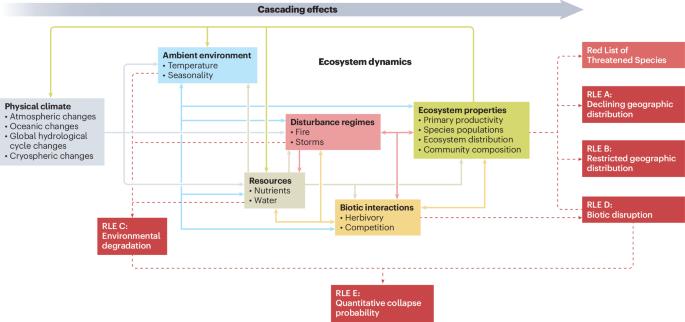评估气候变化下生态系统崩溃的风险
IF 27.1
1区 地球科学
Q1 ENVIRONMENTAL SCIENCES
引用次数: 0
摘要
气候变化影响全球生态系统,但其多样性和复杂性使得很难估计这些影响的严重程度。在这里,我们讨论如何概念化气候变化对生态系统的影响,以便在生态系统风险评估中可靠地捕捉它们,重点关注国际自然保护联盟生态系统红色名录,这是昆明-蒙特利尔全球生物多样性框架的主要指标。我们强调了主要挑战并提出了解决方案,包括使用不同的团队、概念模型和数据源(包括预测)、从类似的生态系统中学习以及评估不确定性。这种方法将提高对气候变化下的风险进行可靠评估的能力,为及时有效的保护提供信息。本文章由计算机程序翻译,如有差异,请以英文原文为准。


Assessing risk of ecosystem collapse in a changing climate
Climate change affects ecosystems globally, but their diversity and complexity make it difficult to estimate how severe these impacts are. Here we discuss how to conceptualize the effects of climate change on ecosystems so that they can be reliably captured in ecosystem risk assessments, focusing on the International Union for Conservation of Nature Red List of Ecosystems, a headline indicator for the Kunming–Montreal Global Biodiversity Framework. We highlight key challenges and propose solutions, which include using diverse teams, conceptual models and data sources (including projections), learning from analogous ecosystems, and evaluating uncertainties. This approach will improve the capacity to produce reliable assessments of risk under climate change to inform timely and effective conservation. In this Perspective, the authors discuss how to robustly consider climate change impacts in ecosystem risk assessments. They highlight challenges in defining impacts, indicators and thresholds, in collating data, and in estimating and reporting risk, and propose solutions to inform conservation.
求助全文
通过发布文献求助,成功后即可免费获取论文全文。
去求助
来源期刊

Nature Climate Change
ENVIRONMENTAL SCIENCES-METEOROLOGY & ATMOSPHERIC SCIENCES
CiteScore
40.30
自引率
1.60%
发文量
267
审稿时长
4-8 weeks
期刊介绍:
Nature Climate Change is dedicated to addressing the scientific challenge of understanding Earth's changing climate and its societal implications. As a monthly journal, it publishes significant and cutting-edge research on the nature, causes, and impacts of global climate change, as well as its implications for the economy, policy, and the world at large.
The journal publishes original research spanning the natural and social sciences, synthesizing interdisciplinary research to provide a comprehensive understanding of climate change. It upholds the high standards set by all Nature-branded journals, ensuring top-tier original research through a fair and rigorous review process, broad readership access, high standards of copy editing and production, rapid publication, and independence from academic societies and other vested interests.
Nature Climate Change serves as a platform for discussion among experts, publishing opinion, analysis, and review articles. It also features Research Highlights to highlight important developments in the field and original reporting from renowned science journalists in the form of feature articles.
Topics covered in the journal include adaptation, atmospheric science, ecology, economics, energy, impacts and vulnerability, mitigation, oceanography, policy, sociology, and sustainability, among others.
 求助内容:
求助内容: 应助结果提醒方式:
应助结果提醒方式:


